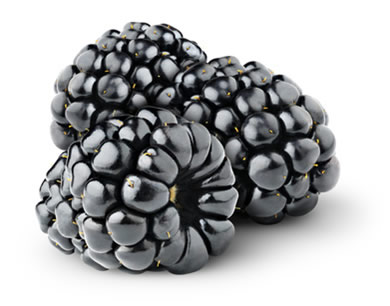Blackberries is the edible fruit of plants in the genus Rubus in the rose family Rosaceae. Grow wild in many parts of the world during the warmer months. Blackberry are formed from several individual seeded fruits that are attached to a single core.
Blackberries have high contents of polyphenolic compounds, such as ellagic acid, rutin, quercetin, tannins, hydrocaffeic acid, p-coumaric acid, cinnamic acid, anthocyanins, cyanidins and gallic acid. Dense antioxidant content help combat all kinds of damage from free radicals. In addition, this fruit are a good source of vitamin K, offering up 36 percent of the daily recommended amount of vitamin K.
Blackberry Benefits
Blackberry are rich in antioxidants to fight oxidative stress, cardiovascular disease, and prevent certain cancers. Phenolic substances of blackberry, exhibit strong anti-inflammatory effects and inhibit the activity of inflammatory chemicals such as Interleukins. According to scientific research exists that eating blackberries, blueberries, strawberries and other berry fruits has positive effects on the brain and may help prevent age-related memory loss and other changes.
Contains high proportions of anthocyanins which work as antioxidants to help fight free radical damage in the body and give berries their deep dark color. Anthocyanins blue, purple, and red color has been associated with a lower risk of certain cancers, memory function, and healthy aging. Also contain ellagic acid, a phenolic compound shown to have anti-carcinogen, anti-viral and anti-bacterial effects. Scientists feel ellagic acid plays a important task in cancer prevention and tumor reversal. One cup of blackberry fruit contains half of the daily recommendation of the vitamin C, which supports the immune system and may lower the risk of developing certain types of cancer. Blackberries are placed near the top of ORAC fruits list with an ORAC of 5350 per 100 grams.
 Scientists from the “Universidade Nova de Lisboa” analyzed two specific species of blackberries, Rubus vagabundus and Rubus brigantinus , and found that their extracts lowered reactive oxygen species levels, while activating caspases. According to a study published in Nutrition and Cancer in 2004 demonstrated that blackberry extracts inhibited DNA oxidative damage and cancer cell proliferation in a human lung cancer cell line.
Scientists from the “Universidade Nova de Lisboa” analyzed two specific species of blackberries, Rubus vagabundus and Rubus brigantinus , and found that their extracts lowered reactive oxygen species levels, while activating caspases. According to a study published in Nutrition and Cancer in 2004 demonstrated that blackberry extracts inhibited DNA oxidative damage and cancer cell proliferation in a human lung cancer cell line.
According to some research, ellagic acid reduces the effect of estrogen on cancer cell growth in breast tissue and promotes the breakdown and removal of cancer-causing substances in the blood via the liver. Ellagic acid may slow the growth of breast and cervical cancer, according to “Ohio State University” scientists. A new study in cell cultures found that ellagic acid may act against substances that help tumors to form new blood vessels. ellagic acid prevents the destruction of P53 gene by cancer cells. Can bind with cancer causing molecules, therefore making them inactive. Also shown to induce apoptosis and potentiate all-trans retinoic acid myeloid differentiation therapy in human leukemia HL-60 cells.
Ohio State University researchers have found that blackberries may reduce esophageal cancer by relieving the oxidative stress caused by Barrett’s esophagus. Researchers gave 32 gr to 45 gr daily for 6 months to 20 patients with Barrett’s esophagus. Analyzed changes in blood, urine and tissue before, during and after the treatment, and found lower levels of some of the chemical markers of oxidative stress in both urine and tissue samples
Anthocyanin pigments and associated flavonoids have demonstrated effective to protect against a myriad of human diseases. To acting as antioxidants and fighting free radicals, anthocyanins may offer anti-inflammatory, anti-cancer and anti-viral effect. 120 patient, those taking 300 mg of an anthocyanin extract daily for three weeks experienced a decrease of between 25% to 60% in many different inflammatory mediators. It is considered that the cyanidin-3-O-glucoside present in blackberry is protective effects against endothelial dysfunction and vascular failure induced by peroxynitrite.
Leave a Reply